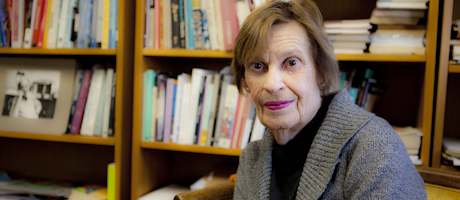With a cast of literary superstar that includes writers E.L. Doctorow, Erica Jong, and Pulitzer winners Tony Kushner and Michael Chabon, it’s easy to understand why Time magazine dubbed Faye Moskowitz’s Jewish Literature Live course as among “the hottest seats in class.”
Each spring, the seminar-style course brings a half dozen authors—from award-winning novelists to emerging writers—to a Columbian College classroom where nearly 30 students and as many as 10 adult auditors hear about plotlines, writing techniques, and the stories-behind-the-stories. At the completion of the course, students receive a collection of the assigned books, each autographed by the author. The class is so popular that it fills up on the first day of registration and some students take it more than once.
Moskowitz, a professor of English and a Columbian College alumna (BA’70, MA’79), is herself a noted author of five books. Time also dubbed her a “teaching star.”
Aryeh Lev Stollman, who has appeared twice to discuss his novel The Far Euphrates, said the class offers something unusual to authors. “There’s a powerful relationship between the writer and the reader but it’s an anonymous relationship because they are unknown to one another,” he said. “Professor Moskowitz’s class offers an opportunity to meet the readers and talk to people who have studied your work and are taking it seriously . . . and, to have someone running the class who truly knows what it means to be a writer adds a whole other layer to the experience.”
The curriculum requires students to read six books or collections of short stories. After each, an author speaks to the class and, later that day, offers an open-to-the-public presentation on campus. When the class read Art Spiegelman’s Maus, the Holocaust memoir that became the first graphic novel to win a Pulitzer Prize, the author and Moskowitz found an unexpected common ground: cigarettes.
“Art Spiegelman made it known to me that he could not talk with students about the Holocaust unless he smoked in the classroom,” Moskowitz recalled. “That was impossible and so we had to do a great deal of negotiating over the cigarettes.”
When class time neared and Spiegelman hadn’t yet made an appearance, Moskowitz had an idea where she might find him. “He was downstairs between the buildings, having a last cigarette. Since I happen to be a smoker, I joined him. We got acquainted and we spent the rest of his visit discovering places to smoke at GW that no one had heard of!”
A “Memorable” Learning Experience
Columbian College senior Justin Solar enrolled in Jewish Literature Live simply to fulfill his Judaic Studies literature requirement. Unsure of what to expect, the course became “my most memorable class at GW.” Not only has Solar now taken the class twice, but he considers Moskowitz a mentor, describing their friendship as “something I am eternally grateful for. I know it will continue long past my GW days.”
One of Solar’s favorite classes featured Bel Kaufman, author of Up the Down Staircase and the granddaughter of Sholem Aleichem, whose stories inspired the musical “Fiddler on the Roof.” Just prior to class, Kaufman stepped out of her DC hotel perfectly coiffed and fashionably dressed. The multi-block walk from the hotel to Phillips Hall presented a formidable challenge for the 101-year-old author, but Kaufman refused to give up her high heels.
“Faye pulled me aside and said, ‘We need to get Bel to class if it’s the last thing we do. If she made it all the way here from New York City, she can make it 15 more feet.’” The final stretch took place with Kaufman seated on a chair that Solar dragged to the classroom.
“It was a grand entrance,” Solar recalled. “I will always cherish it: schlepping Sholem Aleichem’s granddaughter down the halls of Phillips.”
Solar, who aspires to work in the entertainment industry, publicizes the class through Facebook, Twitter, and Instagram. He is joined in the public relations effort by volunteer student assistant Samantha Yakas, a senior who helped with the logistics of getting writers to campus. As a perk, Yakas and Solar often had dinner with the authors.
Yakas, who writes fiction of her own, said both Moskowitz and her class have been inspirational. She marveled at the visiting authors’ honesty. Novelist and screenwriter Bruce Jay Friedman, for example, confided to the class that he’d told friend Mario Puzo that “The Godfather” was a terrible name for his novel. Yakas said it was also fascinating to hear Love Bomb author Lisa Zeidner discuss what it’s like to be a Jewish writer without religion. And Yakas was caught off-guard by the shyness of Nicole Krauss, whose fiction she found “open and honest and raw.” She also was surprised to learn that Krauss does not plot out her books. She simply sits down and begins writing.
Jewish Literature Live opens its “sixth season,” as Moskowitz puts it, in spring 2014. The class owes much of its success to funding support by David Bruce Smith, a 1979 English alumnus. Among other benefits, Smith’s generosity allows the English Department to cover honoraria and travel expenses for visiting writers.


